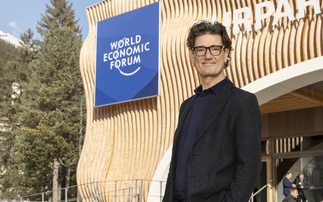The vice-president of sustainability at CCEP, the largest Coca-Cola bottler in the world, spills the details on how the firm intends to achieve net zero packaging, manufacturing, shipping, and ingredients within 20 years
In December, Coca Cola European Partners (CCEP) became the latest major company to announce a goal to achieve net zero emissions by 2040, 10 years ahead of the hard deadline set out by climate scientists and a growing number of governments around the world.
The corporate sustainability strategy, which is aligned with a 1.5C warming pathway and requires the company to reduce its emissions by a third by the end of this decade, is to date the most ambitious adopted by any of the companies around the world that produces and sells beverages franchised by the US-based Coca-Cola Company. It also currently exceeds the Coca-Cola Company's own climate plan, which is aligned with a 2C warming pathway and does not include a net zero goal.
Speaking to BusinessGreen last month shortly after CCEP's new climate goals were unveiled, the Western European bottler's vice-president of sustainability Joe Franses detailed how the company's decarbonisation drive was inspired in part by the climate leadership demonstrated by the governments for its markets, which include Scandinavia, the UK, Belgium, France, Spain and Germany. "Europe is kind of the epicentre of what's going on climate change," he says. "If you look at the markets we operate in - whether it is the UK, Sweden or Norway - most of our markets have the most ambitious policies for carbon neutrality or net zero. We think that it is absolutely right, as a bottler operating those territories, that we push as far as we can to follow that lead and support that transition."
However, Franses also suggests that the plan is in line with a history of corporate climate leadership from CCEP, pointing out that the firm, which is part-owned by the Coca-Cola Company, was among the first 10 companies globally to set a science-based target back in 2009 and has reduced its emissions by more than 30 per cent over the past decade. The UK-headquartered firm has now joined Uber, Microsoft, ITV, Siemens, and Unilever in joining the Climate Pledge, the Amazon-led initiative that unites companies that have promised to deliver net zero emissions a decade ahead of the Paris Agreement's 2050 deadline.
While many plastic campaigners would take issue with the claim that CCEP is an environmental leader - the Coca-Cola Company produces more plastic waste than any other company, and CCEP is its largest bottler by revenue - it is clear the firm is serious about its new goals. Some €250m has been earmarked for decarbonisation efforts at CCEP over just the next three years, and the firm now plans to engage with thousands of its suppliers to ensure they support its efforts to meet its climate targets. Meanwhile, incentives for senior leadership are now based in part on carbon elimination progress.
Moreover, while CCEP's sustainability push is nominally focused on greenhouse gases - the rough plan is to cut the firm's absolute emissions from 3,700,000 metric tonnes of CO2 produced in 2019 to 1,000,000 in 2040 - the mission also promises to significantly reduce the company's plastic pollution. With nearly half of CCEP's carbon emissions produced by packaging, the company plans to deliver large carbon reductions over the coming decade by eliminating its reliance on virgin plastic across all the markets it operates in, with the firm aiming to ramp up its use of recycled plastic from roughly 30 per cent today to 100 per cent by the end of the decade.
With progress to date hampered by low recycling rates and a limited supply of recycled material, the firm plans to advocate for the introduction of national bottle deposit return schemes (DRSs) that boost recycling rates in the markets it operates in. The policy is based on evidence of what works to drive up recycling rates. The regions where CCEP has the highest penetration of recycled plastic - Sweden, the Netherlands, and Norway - all have centralised recycling schemes in place, Franses notes. "Although plastic is often seen as an unsustainable pack, if you get it right in a truly circular fashion, it can have very beneficial and low carbon footprint results," he explains. "Of course, we are the first to recognise there's a distance to travel to deliver that circular model in many markets - in Great Britain, France, Spain, we are very far from that. That is why we are redoubling our efforts on deposit return schemes."
A DRS is set to come into force in Scotland next year, and in England the Department for Environment, Food and Rural Affairs has committed to introducing a similar scheme from 2023. While welcoming these developments, Franses urged policymakers to consider a UK-wide collection scheme, noting that devolved schemes will add a layer of complexity for bottlers and could be more susceptible to cross-border fraud. "It makes it much simpler - one single nationwide scheme, with one deposit fee, with one scheme administrator; a not-for-profit scheme under the auspices of one organisation," he says.
Other initiatives CCEP is counting on to reduce the carbon footprint of packaging over the coming decade are on-going work to reduce the weight of packaging and a push to switch all the company's steel cans to aluminium and replace the shrink wrap around multi-packs of cans with cardboard. The firm is also looking at how it can expand encourage more restauranteurs, retailers and bars to embrace 'dispensed' products - the model popular in pubs and fast food chains where soft drinks are served to customers into a glass or cup instead of a can or bottle."The delivery of a Coke through those formats is much lower in terms of carbon than the delivery of a package product," Franses explains.
The company's new climate goals will require CCEP to also rethink the way it concocts, manufacturers, refrigerates, and transports its products over the coming decade, Franses acknowledges. The company has calculated that there are emission reductions to be gained by taking steps to prevent 'fugitive carbon' escaping from factories where carbon dioxide is injected into beverages to create their fizz; by switching factory boilers from fossil fuels to biomass; by making product shipping more efficient; and by decarbonising the company's fleet of heavy-duty vehicles, such as forklifts, through electrification and the use of alternative fuels.
"Ultimately, we want to get to a place where the sugar, the aluminium, the plastic, the equipment - whether its cold drinks equipment or equipment for a new manufacturing line - needs to be delivered to us in a lower carbon way than is the case today," Franses says. Meanwhile, with more than 93 per cent of the company's emissions produced outside of its direct operations, CCEP intends to engage with all 17,000 of its suppliers to encourage them to set science-based emissions reduction targets and fully transition their operations to renewable electricity within three years, he explains.
Despite cataloguing an impressive list of action points for the coming decade, Franses concedes that the decarbonisation avenues CCEP will invest in throughout the 2030s as it edges closer and closer to its net zero deadline are still unclear. "I can tell you about the three-year roadmap, the five-year roadmap, and I can tell you where we are headed in the next 10 years, but it would be wrong of me to give you certainty on anything beyond that," he admits. "The reason we are prepared to make a net zero 2040 ambition is that we feel that it is right, and the right sense of direction. We feel that the world around us and our suppliers will be determined to act to deliver on that in the longer-term."
Any anxiety about committing to a public net zero target without a full deck of solutions to hand is somewhat cushioned by CCEP's plan to offset any remaining emissions through a carbon offsetting programme that will ratchet up from 2022 onwards, Franses explains. The company's official strategy estimates it will need to secure roughly 1,000,000 tonnes-worth of credible carbon offsets by 2040 to achieve net zero status, although Franses concedes the exact figure remains to be seen. "There's no real certainty," he reflects. "We think that is what it will look like, but we don't know how much will remain."
But ultimately, regardless of whether the net zero gamble pays off, the company has a civic responsibility to aim for net zero by 2040, not least to encouarge its thousands suppliers to follow suit, Franses argues. "We don't have a choice," he concludes. "It is what the science requires, and you have to be guided by the science."
This article is part of We Mean Business' partnership with the Net Zero Festival 2020.









